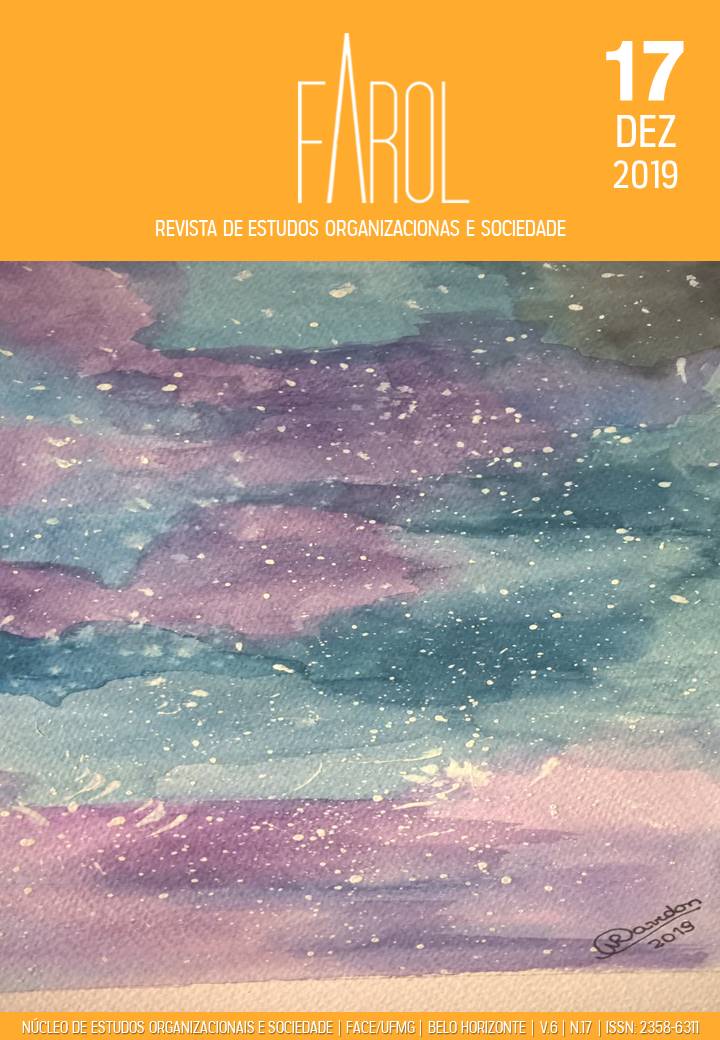ETNOGRAFIA COMO UM PROCESSO DE (RE)EDUCAÇÃO DE SUBJETIVIDADES: FEMINISMOS NEGROS E A APRENDIZAGEM ETNOGRÁFICA COM NEUSA CAVEDON
DOI:
https://doi.org/10.25113/farol.v6i17.5762Palavras-chave:
Etnografia. Feminismos negros. Neusa Cavedon.Resumo
A etnografia é um método de pesquisa caracterizado por um processo de (re)educação de subjetividades. Para além do entendimento da existência do “outro”, o aprendizado etnográfico implica reconhecimento e incorporação de outras (re)existências em nossa vida cotidiana para além de eixos de dominação e subordinação social (COLLINS, 2016). Esse processo possibilita compreender nosso lugar social na pesquisa e nosso lugar de fala na escrita etnográfica. Considerando Neusa Cavedon como sendo uma das principais etnógrafas da área de Estudos Organizacionais no Brasil, discuto suas práticas de ensino da etnografia articuladas ao meu processo de reconhecimento como mulher negra nessa área enfatizando contribuições teóricas do feminismo negro para a etnografia. Com a licença de Exú, orixá que nas religiões de matriz africana abre caminhos para o desenvolvimento pleno de nossas (re)existências, apresento esse texto como uma política de afetos de (re)educação de subjetividades na luta antirracista acadêmica e etnográfica. Laroyê!
Referências
Cavedon, Neusa R. (2003). Antropologia para administradores. Porto Alegre: UFRGS.
Clifford, James (2002). A experiência etnográfica: antropologia e literatura no início do século XX. Rio de Janeiro: UFRJ.
Collins, Patricia H. (2016). Aprendendo com a outsider within: a significação sociológica do pensamento feminista negro. Sociedade e Estado, 31(1), 99-127.
Freire, Paulo (2004). Pedagogia de indignação: cartas pedagógicas e outros escritos. São Paulo: UNESP.
Geertz, Clifford (1989). A interpretação das culturas. Rio de Janeiro: Zahar.
Kilomba, Grada (2019). Memórias da plantação: episódios de racismo cotidiano. Rio de Janeiro: Cobogó.
Kilomba, Grada (2012). Plantation memories: episodes of everyday racism. Munster: Unrast apud Ribeiro, Djamila (2016). Feminismo negro para um novo marco civilizatório. Sur 24, 13(24), 99-104.
Ribeiro, Djamila (2017). O que é lugar de fala. Belo Horizonte: Letramento.
Ribeiro, Djamila (2016). Feminismo negro para um novo marco civilizatório. Sur 24, 13(24), 99-104.
Oliveira, Josiane S. (2018). As influências raciais na construção do campo etnográfico: um estudo multissituado no contexto Brasil-Canadá. Organizações & Sociedade, 25(86), 511-531.
Rocha, Ana Luisa C. & Eckert, Cornélia. (2008). Etnografia: saberes e prática. Iluminuras, 9(21), 1-23.
Downloads
Publicado
Edição
Seção
Licença
Assume-se que em qualquer das modalidades de contribuições aceitas pela Farol – Revista de Estudos Organizacionais e Sociedade, ao submeter um trabalho, o(s) autor(es) se reconhece(m) como detentor(es) do direito autoral sobre ele e autoriza(m) seu livre uso pelos leitores, podendo ser, além de lido, baixado, copiado, distribuído, adaptado e impresso, desde que seja atribuído o devido crédito pela criação original. Em caso de aprovação do trabalho para publicação, os direitos autorais (inclusive os direitos de tradução) são exclusivamente do(s) autor(es).
Os autores devem concordar com os seguintes termos relativos aos Direitos Autorais:
a. Autores mantém os direitos autorais e concedem à revista o direito de primeira publicação, com o trabalho simultaneamente licenciado sob a Licença Creative Commons Attribution que permite o compartilhamento do trabalho com reconhecimento da autoria e publicação inicial nesta revista.
b. Autores têm autorização para assumir contratos adicionais separadamente, para distribuição não-exclusiva da versão do trabalho publicada nesta revista (ex.: publicar em repositório institucional ou como capítulo de livro), com reconhecimento de autoria e publicação inicial nesta revista.
c. Autores têm permissão e são estimulados a publicar e distribuir seu trabalho online (ex.: em repositórios institucionais ou na sua página pessoal) a qualquer ponto antes ou durante o processo editorial, já que isso pode gerar alterações produtivas, bem como aumentar o impacto e a citação do trabalho publicado (Veja O Efeito do Acesso Livre).

